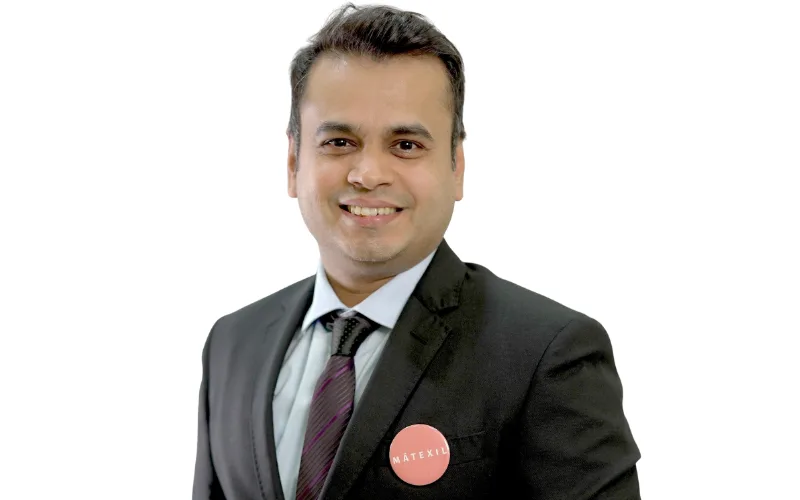Interview with Mr.Anish Jiwarajka, Managing Partner, Jiwarajka Textile Industries
For over four decades, Jiwarajka Textile Industries has woven quality, reliability and innovation into every yarn — bridging India’s rich textile heritage with a modern, future-ready vision
TexMart : Could you brief us about Jiwarajka Textile Industries?
Anish Jiwarajka : Jiwarajka Textile Industries has been part of India’s textile story for more than Four decades. From the beginning, our focus has been on creating yarns that combine quality, reliability and innovation. Over the years, we have grown into a trusted partner for mills, fabric manufacturers and brands across the world. What sets us apart is not just the range of products we make, but the consistency with which we deliver them. Today, Jiwarajka is seen as a name that balances tradition and modernity, rooted in Indian textile heritage while being future ready.
TM: What was the founding vision behind Jiwarajka Textile Industries, and how has it evolved over 40+ years?
AJ : The company was founded with a simple but powerful vision: to be a dependable yarn manufacturer that brings global standards to the Indian market. In the early years, the focus was purely on quality and supply reliability. As the textile industry evolved, so did we, investing in technology, diversifying into new yarn types and embracing sustainability. Today, the vision is broader, as we want to create textiles that not only meet the highest performance standards but also address the environmental challenges our industry faces.
TM: What key milestones have shaped Jiwarajka’s growth and reputation in the textile industry?
AJ : There have been several. Expanding our capacity to become one of India’s leading polyester yarn manufacturers was a turning point. Introducing sustainable yarns with CiCLO technology was another important milestone, which gave us the confidence to stand at the forefront of change rather than follow it. Now, our upcoming venture into industrial yarns and mother yarn marks the next chapter, opening up applications beyond fashion into technical and industrial uses.
TM: What are Jiwarajka’s core product offerings and how do they stand out from competitors in terms of quality and applications?
AJ : Our core offerings include polyester textured yarns, dope dyed yarns and sustainable yarns with CiCLO technology. What makes them stand out is the versatility of applications from fashion fabrics to furnishings, from sportswear to home textiles. We focus heavily on quality control, ensuring consistency batch after batch. That is why our customers stay with us, because they know what to expect and we deliver it.
TM: How is CiCLO technology integrated into your yarns, and what difference does it bring to sustainability?
AJ : CiCLO technology is something we are very proud of. It is integrated right at the yarn manufacturing stage, which means the yarns retain the same performance characteristics as regular polyester, but with one important difference — they biodegrade faster in controlled environments like landfills and oceans. For our customers, this means they do not have to compromise on fabric quality to make a sustainable choice. Alongside CiCLO, we also hold GRS certification (Global Recycled Standard), which highlights our commitment to using recycled raw materials in a responsible and traceable way. This certification gives our partners and customers confidence that the yarns we produce with recycled content are genuine, authentic and aligned with global sustainability goals. Together, CiCLO and GRS reflect our two-pronged approach: innovating for biodegradability while ensuring responsible recycling practices.
TM: How important is research and development in creating new yarns or improving existing ones at Jiwarajka?
AJ : Research and development is at the core of what we do. The textile market changes quickly in terms of fashion trends, functional needs, and sustainability expectations. We can only keep pace if we invest in innovation. For us, research and development is not just about new products, but also about improving efficiency, reducing energy use and finding better ways to meet customer needs. Our move into industrial yarns is a direct result of ongoing research into new applications.
TM: Who are your major customers in domestic and international markets and what unique demands do they have?
AJ : Our customers are spread across India and several international markets. Domestically, we work closely with leading fabric manufacturers and exporters who demand consistency in quality and timely delivery. Internationally, our yarns go into apparel, furnishings, and technical applications for buyers who look for reliability and compliance with sustainability standards. Each market has its own demands and we have built the flexibility to adapt to them.
TM: How does Jiwarajka keep pace with rapidly changing textile market trends and consumer needs?
AJ : The only way to stay relevant is to listen carefully to the market and act quickly. We engage continuously with customers, attend global exhibitions and study consumer trends. Our focus on R&D ensures that when a trend emerges, whether it is sustainable textiles or performance-oriented fabrics, we are ready to serve it. The agility to respond to change has been one of our biggest strengths.
TM: What innovations in products or processes have recently given Jiwarajka a competitive advantage?
AJ : Our integration of CiCLO yarns has given us a strong position in the sustainability space. In addition, we have invested in energy-efficient machinery that reduces costs and improves quality. Process innovations such as tighter quality control loops and digital monitoring have allowed us to give customers more reliability with fewer variations. These steps together help us stay ahead of the curve.
TM: What is your current production capacity and how do you plan to scale it in the coming years?
AJ : Currently, Jiwarajka has a total installed capacity of well over 1,00,000 tons per year across our existing product lines. This includes 58,000 tons of POY, 31,000 tons of DTY, 16,000 tons of FDY and 4,500 tons of Mother Yarn. Each of these categories is supported by state-of-the-art machinery, such as high-precision winders and the latest texturizing equipment, which allow us to maintain consistency and world-class quality. In addition, we are in the process of setting up capacity for Industrial Denier Yarn (IDY) at 9,000 tons per year. While this is not yet operational, it represents our next step into technical and industrial applications, expanding beyond traditional textiles. Looking ahead, we are focused on scaling capacity in a balanced way. That means adding new volumes where demand is strong, such as IDY and specialty yarns, while also investing in automation and efficiency improvements across existing lines. Our growth will not only be about producing more but also about offering higher-value, specialized yarns for global customers who are looking for reliability, innovation and sustainable solutions.
TM: How does Jiwarajka handle challenges related to raw materials, energy costs and supply chain risks?
AJ : These are realities every manufacturer faces. Our approach has been to build strong supplier relationships, diversify sourcing and invest in energy efficiency. We also try to mitigate risks by planning inventory intelligently and being flexible in production. Resilience in supply chain is something we continuously work on so that our customers are not affected by external challenges.
TM: How is the company positioning itself in the global market to remain competitive?
AJ : Globally, we are positioning ourselves as a reliable Indian manufacturer that delivers international standards with a strong sustainability focus. We are expanding our reach in markets that are highly conscious of environmental impact, and we are strengthening our certifications and compliance to meet global standards. Our long-term strategy is to be known not just for volume but also for innovation and responsibility.
TM: What new technologies or sustainable practices are you adopting in textile manufacturing?
AJ : We are adopting technologies that reduce environmental footprint, such as energy-efficient machinery and water-saving processes. Sustainable yarn production with CiCLO is one example. We are also exploring recycled inputs and more circular practices in production. Sustainability is not a one-time project but a journey, and we keep improving year after year.
TM: How is automation and digitalization being implemented across your production facilities?
AJ : Automation is becoming increasingly important in ensuring consistency and productivity. We have introduced digital monitoring systems to track quality in real time and to reduce human error. Automation also helps us scale without compromising on standards. Digitalization is equally important in supply chain and customer engagement, helping us become more transparent and responsive.
TM: What challenges have you faced in introducing sustainable yarn technologies and how were they overcome?
AJ : The initial challenge was educating both our team and our customers about the benefits of sustainable yarns. There is often hesitation in trying new materials because of concerns about performance. We addressed this by running extensive trials and demonstrating that performance remains uncompromised. We also worked closely with partners like CiCLO to ensure smooth integration into our production lines.
TM: What are the company’s long-term growth strategies for the next 5 to 10 years?
AJ : Over the next decade, our focus is on three pillars: expanding product range, enhancing sustainability and growing global reach. We want to establish Jiwarajka as a leading name not only in apparel and furnishing yarns but also in industrial and technical yarns. We will continue to invest in innovation and sustainability as these are the key drivers of long-term relevance.
TM: Are there plans to diversify into new product lines, geographies, or value-added textiles?
AJ : Yes, we are already in the process of diversifying into industrial yarns, which will open new applications in areas like automotive, infrastructure and technical fabrics.
TM: What social or community-focused projects is Jiwarajka actively engaged in as part of CSR?
AJ : We are engaged in projects that support education, healthcare and skill development in our communities. We want to contribute to creating opportunities around us, especially for young people who will be part of the future workforce. Our CSR is about making a meaningful impact rather than one-time contributions.



